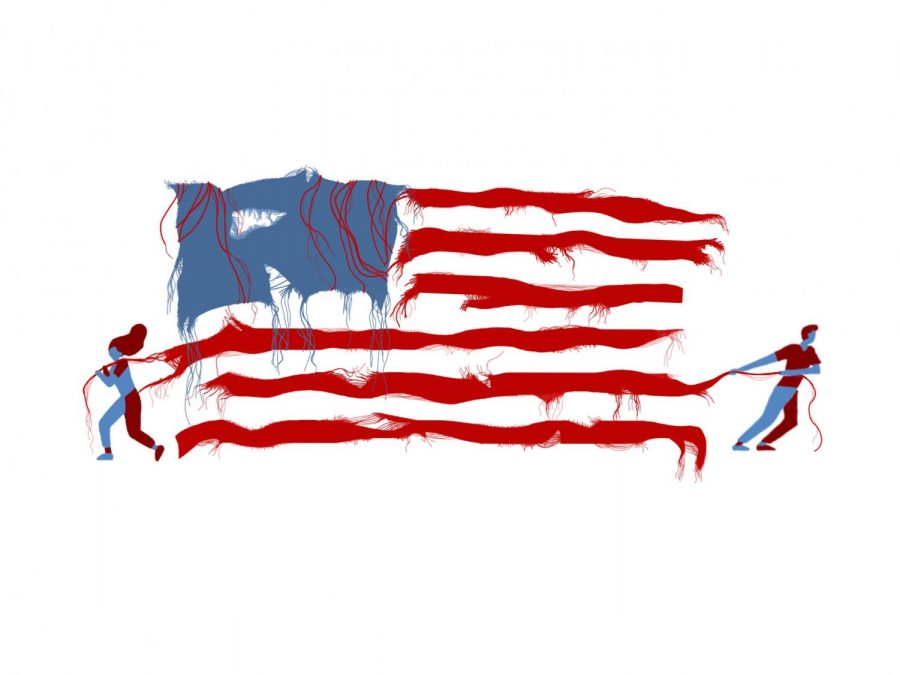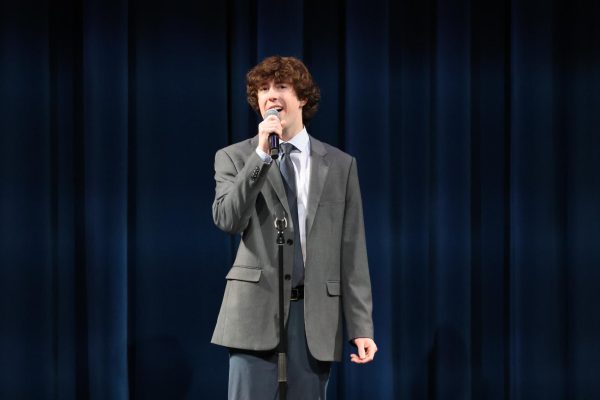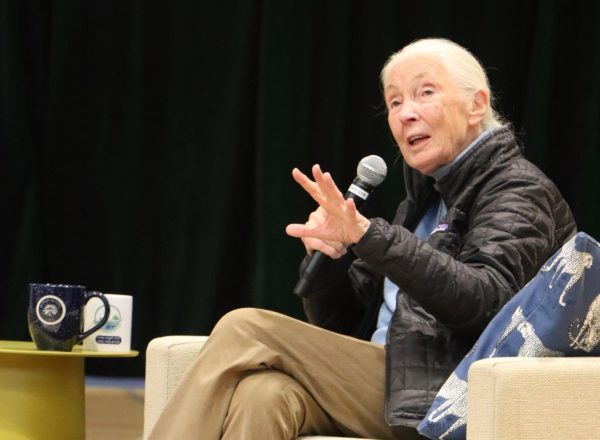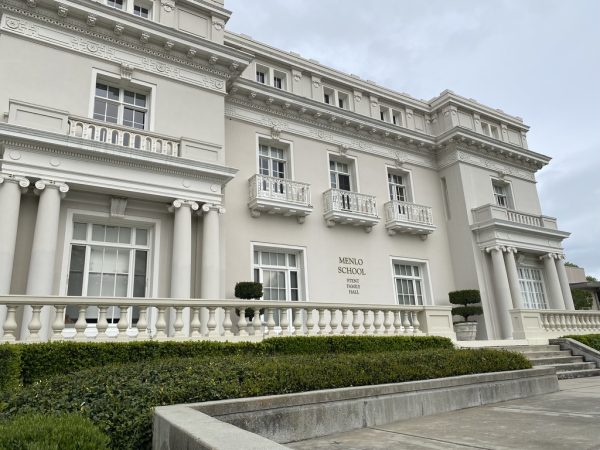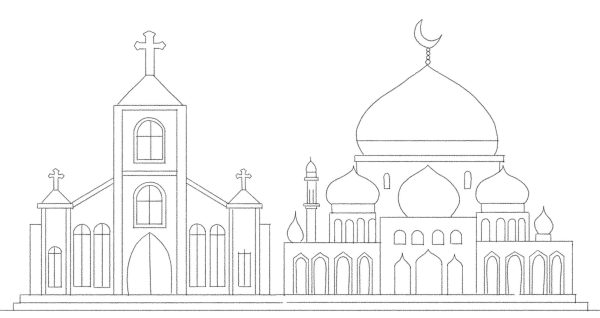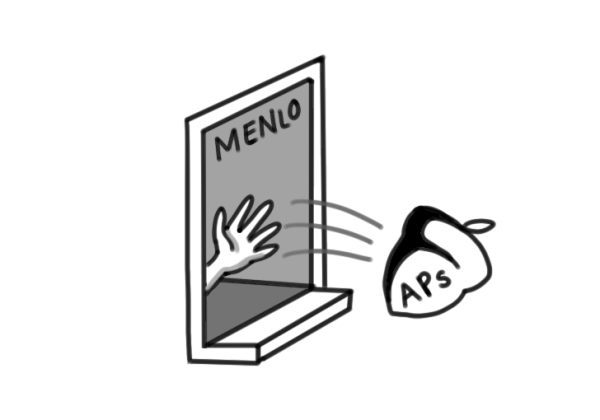Menlo Community Members Consider Trump and Biden, Anticipate Election Outcomes and Perils
Menlo students and teachers reflect on America’s deteriorating condition in anticipation of the Nov. 3 elections this year. Many members of the school community fear that regardless of the election’s outcome, extreme national polarization will lead to mayhem in the following months and beyond. Illustration courtesy of Kate Richardson.
October 23, 2020
Note: This story is the first of a two-part series about the 2020 elections; read the second one here. The series is an extension of a story that appeared in The Coat of Arms October 2020 47.1 print edition.
———
As the 2020 general elections approach on Nov. 3, Menlo community members are reflecting on possible outcomes and on America’s political climate. Opinions and predictions abound, but many individuals at Menlo agree on one notion: the United States is headed down a destructive path.
Thoughts on Trump and Biden
“I don’t think I would vote at all if I could,” senior Andrew Rajkovic said. To Rajkovic, both presidential candidates — Trump and Biden — are equally unfavorable. Rajkovic does not feel that he aligns with either major political party.
History teacher Matthew Nelson agrees that neither candidate is ideal. “Joe Biden has not been a great debater. He can be Sleepy Joe, as Trump calls him,” he said. “And Trump too; Trump has shown a little bit of cognitive degeneration.” Nelson identifies more with left-of-center ideologies but prefers to view politics issue-by-issue.
This sentiment also resonates with freshman Mikey McGrath, who considers himself more right-of-center. “I’m not a very big fan of either [candidate],” he said.
Nonetheless, McGrath tends to agree more with Trump’s political stances. “I think that Trump is not a very good character or role model for the country,” he said. “But I do believe that his policy views would not be as detrimental to our country.”
Other Menlo students, however, hope for a Biden victory. “I think chaos is going to reign if Trump is reelected because we’ve seen how poorly he’s handled issues in the past four years,” sophomore Malia Chavinson said. Chavinson is a self-described Democrat.
“I don’t think Trump has handled the presidency well; I don’t think he’s made a lot of good decisions,” junior Claire Lenden, who identifies as politically liberal, said. “And I think we’re in a worse place than we were four years ago.”
Senior Ilan Listgarten agrees, too, that a Biden presidency would involve less harm to the nation. “I’m hoping to have someone who’s less divisive and somebody who can bring us together, as well as fix some of the social issues,” he said. Listgarten tends to agree with liberal views.
Yet Lenden believes that Biden is not as effective as he could be right now in promoting his campaign, especially among young voters. “Biden is not doing enough to rally the youth vote and things which I think are going to be instrumental in this election,” she said.
Nonetheless, according to polls as of Oct. 22, voters in most states seem to favor Biden over Trump by significant margins. “It’s Biden’s election to lose,” history teacher Dan Devitt said. Trump, on the other hand, has an “uphill battle,” he said. Devitt calls himself a political contrarian and is a registered independent. He wishes not to disclose his specific beliefs because of the increasingly intolerant culture around politics.
Chavinson hesitates to rule out the possibility of a Trump victory. “I think he’s got a really strong base, and they’re all going to turn out,” she said.
Upper School Director John Schafer’s opinions reflect the same notion. “It’s possible there are more people who are pro-Biden, but it’s also possible that there are more energetic people who are pro-Trump,” he said. Schafer prefers not to discuss his political leanings; he is currently teaching a class called The 2020 Election and hopes to remain as bipartisan as possible for his students’ sake.
“I think everyone will, no matter what side they’re on, feel like this is a vital election just because of the huge contrasting issues between the two candidates,” Listgarten pointed out.
Predictions for 2020
“At the end of the day, Biden will become president with a narrowly divided Senate and a Democratic House,” Schafer said. “That’s what I predict, but, you know, who would have predicted the pandemic?”
Many students and staff members at Menlo turn to polls for an indication of possible election outcomes. As of October 2020, Biden has been leading by significant margins and is forecasted to win the election; however, Americans are still skeptical of polls since the 2016 presidential election.
Nelson thinks that a victory this year is extremely crucial for Democrats. “If they do not win the presidency and the Senate, the Democrats are going to be behind the eight ball for a generation.”
He is watching for the voting patterns of Latinos and Cuban Americans in Florida, blue collar workers in Wisconsin and people of color in Arizona, Nevada and Texas. Each of these demographics, he believes, could have a significant impact on election results.
In addition to the presidential election, Nelson is also tracking Congressional races in several states. This year, according to Ballotpedia, 35 of the 100 total Senate seats, as well as all 435 seats in the House of Representatives, are up for election.
The House of Representatives, which leans left, is expected to remain Democrat-controlled. On the other hand, more uncertainty exists around the Senate: while it is currently controlled by Republicans, many states and seats are likely to flip. Nelson predicts that Democrats will pick up several seats so that the Senate becomes more narrowly divided.
To Devitt, the election does not bode well for the future of the United States. “I have some pretty pessimistic feelings about this election,” Devitt said. He is not particularly hopeful about the direction in which the nation is headed, and he anticipates conflict regardless of who wins the presidency.
Rajkovic shares this sentiment. “I think it could and most likely will get nasty,” he said.
Nelson worries that the election will result in deeper divisions along political party lines. “Then you’re going to see a radicalization of politics in the United States, where people taking to the streets will just be a weekly occurrence.”
America Divided and Democracy Endangered
“I think we’re just becoming more divided, which is not a good thing,” McGrath said. “Especially with Trump, I think he’s been kind of criticizing all his opposition and not really acknowledging them.”
Many Menlo community members voiced their unease about the future of American democracy as partisan lines create deep schisms between parties and individuals. Nelson used the term “lethal mass partisanship” to describe America’s disconnected condition.
“There are more cultural, political, religious and social forces pushing Americans apart than keeping us together,” Nelson said.
One of the consequences of this lethal mass partisanship, he explained, is a radicalization of political parties and labels. “Political identities are changing so quickly,” he said. “We just don’t know who we’re talking about when we’re talking about political identities.”
“I don’t even know where to situate myself anymore. Ideas that used to be considered liberal are now kind of considered centrist,” Nelson said.
“I chafe at the far left and what’s happening there,” he added.
He is also distressed by recent shifts in the Republican party. “One of the things that really keeps me up at night is the idea of minority rule,” he said. “Republicans are losing popular support of the people. Yet, they’re acquiring more and more and more political power.”
“And then I worry about corporate interests influencing the Republican party. They’re more beholden to big business, big oil, big pharma — and not responsive to the people,” he said. “But I also think about the Democrats and how the Democrats have been too divided and too factional. They have these purity tests, and they’ve got identity politics. And sometimes they take their eye off the ball; they don’t see that maybe they should be more disciplined as a party.”
“Honestly, I see it as a race to the bottom. Let’s go back in time, just a little bit. […] I think about the great friendships where one senator crossed the aisle or one governor crossed the aisle,” he said. Today, however, these bipartisan alliances have largely disappeared, according to Nelson. “I despair that because of this fierce tribalism, […] we are just headed toward the abyss.”
In the context of the presidential election, Nelson’s dismal forecast might mean that some Americans will refuse to accept election results. “I just hope that people can accept the outcome of it and not try and delegitimize the winner,” McGrath said.
“I worry that it might become dangerous in the streets or dangerous elsewhere from people overreacting,” Rajkovic said.
“I think we’re in real danger of slipping into civil disobedience and resistance against the government, and I’m talking from both sides,” Devitt said. He worries that the election will be more divisive than beneficial to the United States and that the country is headed in a perilous direction.
Schafer sees this risk as possibly ruinous to American ideals. “Once you start losing confidence that the vote is actually fair and capturing the people’s will, you’re really taking a wrecking ball to the foundation of a democracy.”
“I just kind of wonder, seeing the two major political parties engaged in scorched-earth governance,” Nelson said. “How do individuals have peaceable dialogue — simple discourse — yet our government seems to be headed toward the flames?”
Note: In the approximately two weeks since Devitt and Schafer were interviewed by The Coat of Arms, the presidential debate and other recent political events have caused slight modifications to their perspectives. Devitt and Schafer both believe that the election’s prospects now seem more decisive. “Since we spoke, I think the odds that the election will be a cliffhanger have diminished. Biden seems to have consolidated his lead and has more paths to victory than Trump,” Schafer said in an email to The Coat of Arms.


